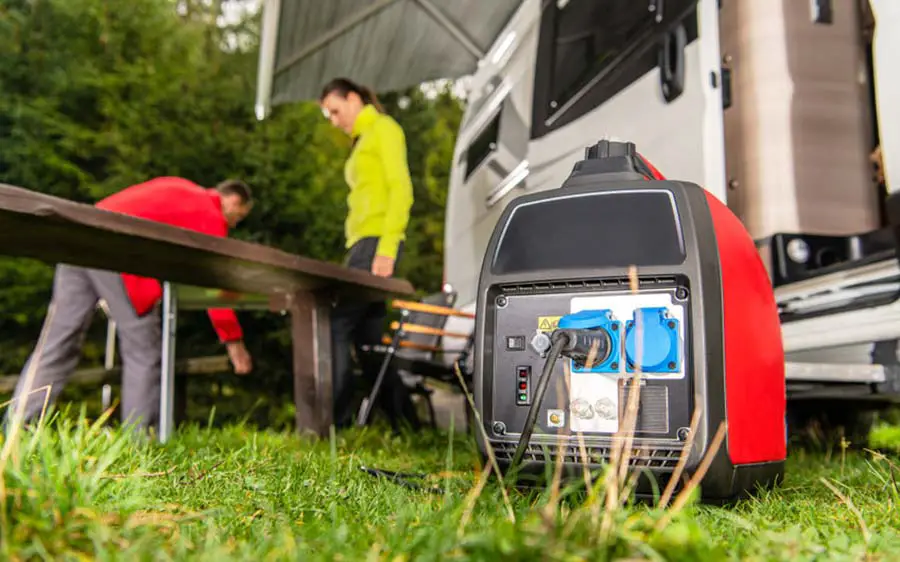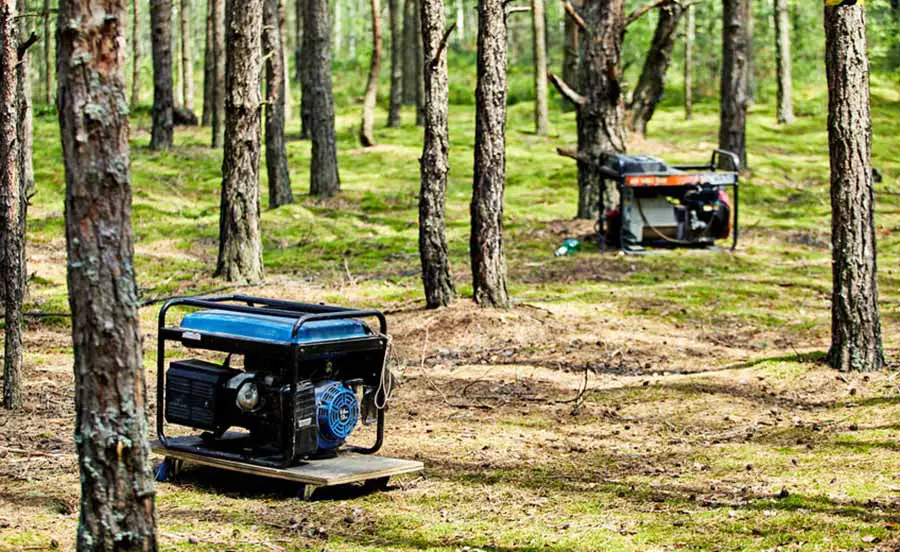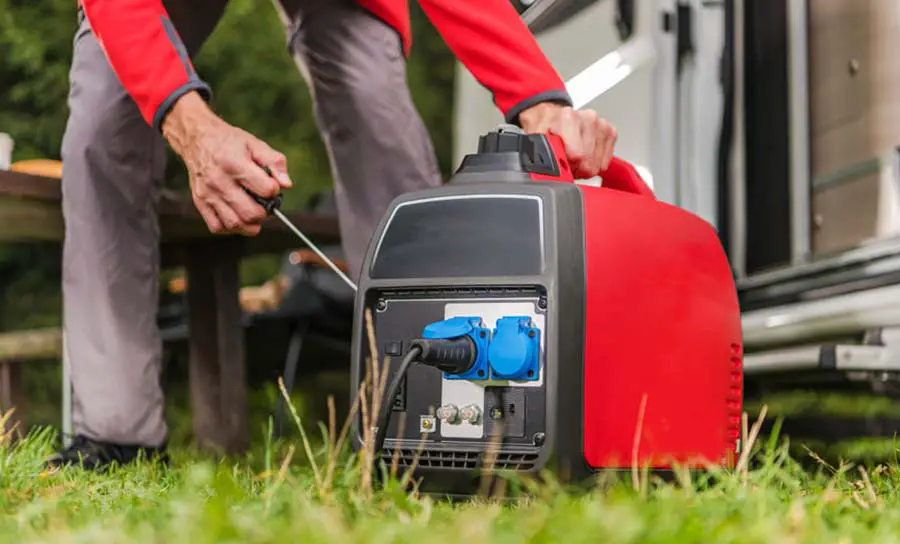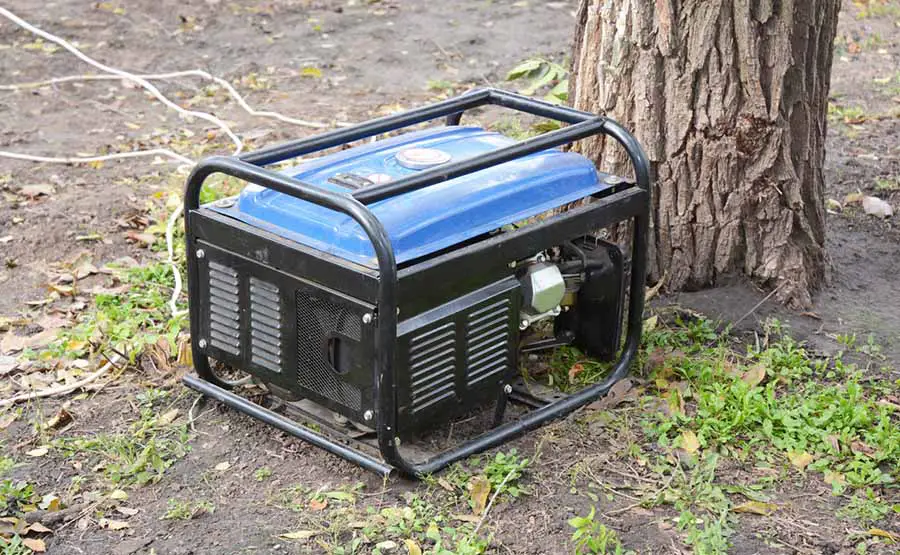
Portable generators are very useful when out camping. Their ability to power everything help make camping comfortable. Unfortunately, generators are noisy. Here you will find ways to quiet your generator while camping in the great outdoors.
To reduce the noise from your camping generator, place it as far away as possible with the muffler facing away and build a sound-deflecting wall. Putting your generator on soft material and adding rubber washers to bolts in the engine housing can also help to dampen the noise from your generator.
There is much more than you can do to quiet your generator, so we created a list of tips and discussed some great ways to quiet down your camping generator in this article. Not all of these tips will apply to your situation. However, we are certain that you will find a solution in this article, so keep reading!
1. Get the Correct Size Generator for Your Needs
Before you buy a generator, you should know what your power needs are going to be. When you know what power needs you have before buying, you might avoid a noisy generator situation altogether.
The more power your generator puts out, the more noise it will make. You should consider the amount of power you need, the amount of noise you are willing to accept, and how much you are willing to spend on a generator.
Generally, some people only require enough electricity to charge cell phones, tablets, and essentials when camping.
If you want to power small devices like these, you can buy a smaller, less powerful generator. Typically, generators with a few hundred watts can handle these smaller tasks and are less noisy.
If you want to power larger appliances like your camper’s microwave, refrigerator, or air conditioner, you will need a generator with a higher wattage output. Larger generators that can cope with these larger items have usually had an output of 2,000 – 5,000 watts.
There are generators on the market designed to have a higher wattage output while being quieter than other models at the same time. Unfortunately, these generators are generally more expensive due to having the best of both worlds.
2. Turn the Exhaust Pipes Away From the Campsite
The generator’s exhaust pipe is one of the noisiest parts. Keep in mind the position of your generator when you use your generator while camping. Pay attention to where the exhaust end of the generator is pointing. Always place this side of the generator facing away from your campsite.
Some models of generators also make it possible to point the exhaust pipes upward toward the sky. Either one of these positions will direct the generator noise directly away from you. However, in a crowded campground, like what you find at most national parks, it may be challenging to position your exhaust pipe so that it does not face directly into a neighbor’s campsite.
When it is not possible to face the exhaust pipe your neighbor’s way, it is often best to point your exhaust pipe towards a sound-absorbing environment, like a forest,
3. Move Your Generator Further Away
The next thing to keep in mind when making your generator quieter while camping is the distance you place your generator away from your campsite. This is important if you want to make sure your campsite stays quieter while using your generator.
The distance you place your generator away from your campsite will depend on a few different things, whether you are camping on a campground with specifically allocated campsites or open land.
When you are camping at a campground that only offers smaller camping spots, you need to keep your camping neighbors in mind. You would not want to bother your neighbor campers with the noise from your generator by moving it closer to their campsite.
When you are camping on a campsite with no other people around, the biggest thing to consider is how long your extension cords are. The further away your generator is placed from your campsite, the quieter it will be.
Generally, most generator brands will show what decibel rating that particular model has. Usually, decibel ratings are measured at about 7 meters out from the operating generator in most cases. The best idea is to place your generator at least 20 feet away from your campsite to operate in that decibel range.
When you have the space and no camping neighbors, investing in some heavy-duty extra-long extension cords will let you put your generator as far away from your campsite as you like.
Keeping your generator 20 or more feet away from your campsite will vastly cut down on the noise and let you focus on enjoying the great outdoors.
4. Put Your Generator On a Soft Surface

Another critical point to remember when trying to quieten your camping generator is the surface you place it on while operating. When you find a reasonable distance to put your generator away from your campsite, place it on a surface that will dampen the noise instead of amplifying it like grass or dirt.
Try to avoid all hard surfaces like concrete or asphalt, or wood. These surfaces will only increase the noise level.
When camping, the best options to place your generator on are grass or dirt. Both are great surfaces to place your generator on to lessen noise. Grass or dirt will absorb the sounds generated from the rumbling generator.
If you are on a campsite with no softer ground to place your generator, anti-vibration mats are a great solution. Anti-vibration mats are typically made of rubber and will soften the vibration and noise. You can place one of these anti-vibration rubber mats underneath your generator, and it greatly reduces noise caused by the generator’s vibrations.
5. Build Sound Deflectors Around Your Generator
The next thing you can do to quieten your camping generator now that you have placed it on a surface further away from your campsite is to use sound deflectors/ sound walls.
It might sound technical, but it is very easy to install. Sound deflectors can go a long way when trying to muffle your generator noise.
There are only a few things you need, and these are four sheets of plywood and a sheet of non-flammable material. You can use drywall for the non-flammable piece as it is a good material for this purpose, and it is relatively fire-resistant. The pieces of plywood and drywall should each be around 4 feet wide and 3 feet tall.
It is easy to prop each piece up against the generator at specific angles like a box. You could simply prop up the plywood and drywall using a large rock. A better long-term solution would be to create a small stand out of wood to hold the boards upright. Use the piece of drywall for the side of the generator that houses the exhaust to ensure your deflectors don’t catch fire.
When placing these pieces of wood around the generator in a box form, you should leave room for airflow while deflecting the sound waves down into the earth. Sound deflectors will immediately lower the decibels that your generator is putting out without affecting its performance in any way.
6. Build a Baffle Box for Your Generator
Build an acoustic enclosure or baffle box for your noisy generator as another idea almost the same as the sound deflector option.
This option works just as great as what deflectors do. The baffle box enclosure will contain sound waves and greatly lower the noise decibels coming from your generator.
The best thing about an acoustic enclosure or baffle box is that it is compact and easy to move around, unlike the five panels of plywood in your trailer or RV. If you are not too keen on DIY, then you can purchase a baffle box.
How To Build a Baffle Box to Quiet a Generator
If you do decide to build your baffle box, it’s a fairly easy process. There are online tutorials available. Here is what material you need to build a baffle box:
- Wood 2×4’s
- Foam Sealer
- L-brackets
- Quiet board
Make sure you seal the edges of the baffle box with duct tape or acoustic caulk to make the seams airtight. A good soundproof barrier will reduce the noise generated from your generator by 15-20 decibels. You can increase the noise reduction even more by another 5-7 decibels by adding sound absorption, like the Mega Zorbe, inside the baffle box.
You should include sufficient holes for airflow if you do plan to use a homemade baffle box. Good ventilation and airflow are crucial because if there is not enough airflow in the baffle box enclosure, the heat it generates will damage your generator. Cut big enough spaces in the side of the box near the generator’s exhaust to allow airflow.
7. Attach a Replacement Muffler to Your Generator
Another popular thing people use to soften the generator noise is to install a larger replacement muffler. A muffler will soften the sound coming out of the exhaust pipes attached to the generator’s motor.
There are perforated tubes inside the muffler designed to deflect the noise from the engine to soften the noise that eventually exits the exhaust.
The exhaust is one of the loudest parts of the generator, second only to the engine. By installing an upgraded muffler, you will quiet down the generator around 10-12 decibels.
Keep in mind that finding a muffler that will fit your generator may be difficult, unlike finding a muffler for your truck or car. Many types of generators with different sized exhaust pipes on the market make this difficult.
Finding a muffler that will fit your generator out of the box most likely won’t happen. Your best option is to speak to a small engine maintenance specialist or specialized mechanic to solve this. They should give you a better idea of what choices are available to replace your generator’s muffler.
8. Use Water as a Muffler for Your Generator
If installing a replacement muffler sounds like too much work, you can try using water to muffle the noise instead. There is still some customization that needs to be done do for this.
You need a 5-gallon bucket of water, a hose, and a clamp to fix the hose to the exhaust pipe. You should place the generator on higher ground than the bucket of water. This is necessary to stop the water from flowing backward into the generator’s exhaust pipe. Poking a few small holes in the hose as an extra precaution to stop any backflip of water is a good idea.
The water muffling setup is fairly simple. You should connect the hose to the exhaust pipe using your clamp. After that, place the other side of the hose into the bucket of water. The water will then act as a muffler to the exhaust noise coming from the generator. When using this water muffler method, you will quiet down the generator around 5-7 decibels.
9. Reduce Vibration Noise in the Engine Housing
Most of the noise a generator produces comes from vibration. To soften vibration noise, you can add vibration dampening material to the engine housing. Have a good look at the generator’s engine and look for the screws that are attached to secure the engine to the frame. There are rubber washers placed between the screws and the frame.
Add a second rubber washer under the screws for even more noise reduction. You can replace the bolts with longer bolts to make room to fit a second washer, but the noise reduction the extra rubber washers provide is well worth the extra effort.
10. Buy a Quieter Camping Generator

Technology has greatly advanced, and manufacturers are working to make generators quiet. There are already some great options available on the market that produce a lot less noise than the typical camping generator. Here is a list of some quieter generators:
Champion Power Equipment 3,100W Generator
This generator is powerful and can produce an impressive 3,100 Watts of power and still only has a decibel level of 58 dBA at 23 feet. An average human conversation is 60 dBA. You can’t get much quieter than that, especially given the power this generator put out.
The Champion Power Equipment 3,100W weighs less than 100 pounds and runs off a single-cylinder 171cc 4-stroke OHV engine. The Champion generator can run for 8 hours on a single tank of gasoline at 25% usage.
Honda EU2000i 2,000W Generator
At 2,000 W, the Honda EU2000i is not as powerful as the Champion Power Equipment 3,100W, but this generator is even quieter. The Honda generator runs at 59 dBA when at full power when standing right next to it. This generator weighs only about half as much as the Champion Power Equipment 3,100W, making it incredibly portable.
Though you might feel you need more power than the Honda EU2000i offers, it is an excellent quiet option to consider if maximum power isn’t your priority.
Honda produces inverter generator engines that are generally smaller with lower power output, another noise-reducing factor. They run quieter because the engine does not constantly run at full speed. Honda engines and generators also have special materials added to dampen sound, making them run incredibly quietly.
Yamaha EF2000iS 2,000W Generator
The Yamaha EF2000iS 2,000W is slightly louder than the Honda EU2000i when running at full power. It has a rating of 61 dBA. However, this generator shines when it is running at 25% power. When operated at this level, the Yamaha EF2000iS 2,000W has a rating of just 51.5 dBA, which is almost whisper-quiet.
In almost every single way, the Yamaha EF2000iS 2,000W is very comparable to the Honda. It is roughly the same size and delivering the same power.
Briggs & Stratton P3000 3,000W Generator
This generator is another more powerful option than the Champion Power Equipment 3,100W. This 3,000W generator can deliver an impressive amount of power while only being rated at 59 dBA. The high-power output this generator creates is great for backing up your home. The 1.5 gallons of gasoline it uses will last you about 10 hours when running the generator at 25% power.
It is important to note that none of these listed generators deliver quite the same power level as a full-sized emergency generator. However, if a quiet generator is a priority, buying one of these is an excellent option to consider.
These generators listed are also more portable and more fuel-efficient, and less noisy, both of which prove to be advantageous.
FAQ and Additional Tips for Reducing Camping Generator Noise

Here are some additional tips and suggestions for making your camping generator as quiet as possible so you can enjoy the nature surrounding you without an obnoxiously loud engine running in the background.
The Cost of Reducing the Sound of Your Generator
If you decide to purchase instead of building some of the items we listed above, here are the estimated costs:
- Generator Noise Reduction Box ($120-$150)
- Generator Muffler ($400-$500)
- Soundproof generator compartment ($120-$150)
- Replace the Noisy Camping Generator with an updated model ($1000+)
Nobody wants to buy a new camping generator. But sometimes, the expense of buying a new one makes sense. Buying a new generator will spare you the hassle of having to try all of these hacks to quieten your old noisy generator, and your camping trip will be peaceful.
How Many Decibels is Considered Quiet for a Camping Generator?
Generally, generators with a decibel rating between 50 to 65 dBA are quiet enough to use at most campsites, though you should still stake steps to ensure they are as quiet as possible and do not disturb anyone.
What are the Best Materials for Soundproofing a Generator?
The best soundproofing materials to quieten your camping generator is materials that have loosely packed fibers. They work best for sound absorption. Foam is great to control heat build-up but is not the best quality for soundproofing. Fiberglass board is another product that is very effective to use when soundproofing your generator box.
Electric Generators are Generally Quiet
If you are serious about a quiet camping experience, buying an electric generator might be your best bet.
Truthfully, most methods for quieting a diesel or gas generator will only reduce the generator’s total noise output and not eliminate the noise. If you want a noise-free blissful camping experience, buying an electric generator is the way to go.
EcoFlow Delta Pro Power Station and EcoFlow Delta Max Station are great alternative options to regular gas and diesel generators. These electric generators are your best option for a noise-free camping trip.
Solar Power Generators Produce Less Noise
As you can see, there are a lot of ways to quieten your generator. Another alternative option is to install a Solar power generator. These solar-powered camping or RV generators are great for basic camping. These generators store solar energy in lithium-ion battery cells that you can use at any time.
You can operate them during the day while the panels are in the sun and at night when you need power. It is easy to install, and it will be powered up and ready to go when you need it.
One of the most powerful solar-powered generators is the Goal Zero Yeti 3000. This solar power generator is great as a backup generator even for your home when not using it while camping. The Yeti 3000 weighs around 70 pounds. You can charge it at home or charge it through solar panels. The Yeti 3000 solar power generator meets basic energy needs if you are not running all of your appliances at once.
If you need to run many appliances simultaneously, most solar generators can chain them together. Chaining solar-power generators together allow for more power and the ability to output larger amounts of electricity.
Camping with solar power generators is not for everyone. Consider using solar power when camping next time. Making a smaller carbon footprint is something we all should consider.
Conclusion
It is fairly easy to build a sound box or attach a muffler to quieten your camping generator. Anyone with DIY skills and basic tools can do it. But sometimes, replacing your old noisy camping generator with a Westinghouse iGen 2200 Super Quiet Portable Generator or the Honda EU2000i is a better idea for you and the environment.
The next time you go camping with the noisy old slugger, think about upgrading to a more environmentally friendly option like a solar-powered unit or one of the more technologically advanced models listed above that runs a lot quieter and smoother.

